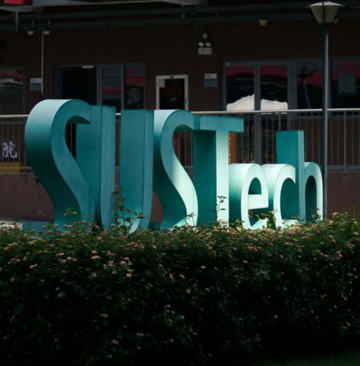SUSTech Zuotai Zhang's team makes advanced progress in treatment of wastewater
Recently, the team led by Professor Zuotai Zhang of the School of Environmental Sciences and Engineering at the Southern University of Science and Technology (SUSTech) has made significant progress in the advanced treatment of wastewater. The results have been published in the highly influential academic journal Environmental Science & Technology, entitle “Atomically Dispersed Cobalt Sites on Graphene as Efficient Periodate Activators for Selective Organic Pollutant Degradation.”

In recent years, non-radical pathway-based advanced oxidation technologies for the decontamination of recalcitrant organic pollutant has gained significant research interests. Compared with the conventional free-radical species-based oxidation process, the non-radical oxidation process possesses huge advantages in practical applications.
Firstly, non-radical species such as singlet oxygen (1O2) normally display an excellent selectivity toward electron-rich pollutants or bacteria. Secondly, the non-radical-based advanced oxidation process shows strong resistance to external interference, that is, it is less affected by water pH conditions and coexisting background substances (e.g., inorganic anions and natural organic matter). Lastly, in the process of non-radical oxidation, the utilization efficiency of oxidants is much higher, which can reduce the overall cost of water treatment technology. Therefore, it is of great significance to develop novel and effective advanced oxidation technology systems based on the non-radical oxidation pathway.
In this work, the team developed a novel non-radical-based advanced oxidation technology using a single-cobalt-atom activator catalyzed periodate oxidation process. According to their results, the single-cobalt-sites on carbon carriers effectively activated periodate to selectively degrade organic pollutants through an electron-transfer-based non-radical pathway.
Based on the experimental and theoretical data, it was proposed that the periodate molecule was first adsorbed on the activator surface to produce a metastable activator-periodate complex that possessed a high oxidation potential. Then, the above-formed complex extracted electrons from the aromatic organic pollutants such as phenol, 4-chlorophenol, and rhodamine B thereby resulted in pollutant degradation and mineralization. The developed system possesses a wide pH adaptability and strong resistances to external interference in the complex water matrix, therefore opening new directions to design high-performance non-radical oxidation technology for wastewater treatment.
Yangke Long, a postdoctoral fellow from the School of Environmental Sciences and Engineering at SUSTech, is the first author of the paper. Professor Zuotai Zhang from SUSTech is the corresponding author.
This work was supported by the China Postdoctoral Science Foundation, National Natural Science Foundation of China (NSFC), Shenzhen Science and Technology Innovation Committee, and the Shenzhen Peacock Plan Project.
Paper link: https://pubs.acs.org/doi/10.1021/acs.est.0c07794
